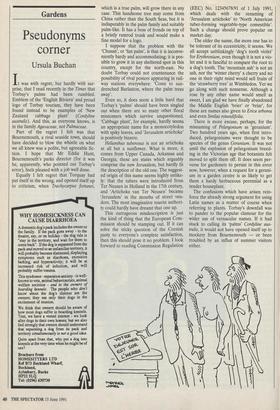Gardens
Pseudonyms corner
Ursula Buchan
It was with regret, but hardly with sur- prise, that I read recently in the Times that Torbay's palms had been rumbled. Emblem of the 'English Riviera' and proud logo of Torbay tourism, they have been found instead to be examples of 'New Zealand cabbage plant' (Cordyline australis). And this, as everyone knows, is in the family Agavaceae, not Palmaceae.
Part of the regret I felt was that Bournemouth, a rival seaside town, should have decided to blow the whistle on what we all knew was a polite, but agreeable fic- tion. I hope that Mr Eddie Hunt, Bournemouth's parks director (for it was he, apparently, who pointed out Torbay's error), feels pleased with a job well done.
Equally I felt regret that Torquay had put itself in the wrong, and opened itself up to criticism, when Trachycarpus fortunei, which is a true palm, will grow there in any case. This handsome tree may come from China rather than the South Seas, but it is indisputably in the palm family and suitably palm-like. It has a boss of fronds on top of a bristly ramrod trunk and would make a fine model for a logo.
I suppose that the problem with the `Chusan', or 'fan palm', is that it is inconve- niently hardy and accommodating; it is pos- sible to grow it in any sheltered spot in this country, except for the north-east. No doubt Torbay could not countenance the possibility of rival posters appearing in rail- way stations everywhere: 'Come to sun- drenched Barlaston, where the palm trees sway'.
Even so, it does seem a little hard that Torbay's `palms' should have been singled out when there are so many other floral misnomers which survive unquestioned. `Cabbage plant', for example, hardly seems an appropriate name for a monocotyledon with spiky leaves, and 'Jerusalem artichoke' is positively bizarre.
Helianthus tuberosus is not an artichoke at all but a sunflower. What is more, it comes from Upper Canada, Arkansas and Georgia; these are states which arguably comprise the new Jerusalem, but hardly fit the description of the old one. The suggest- ed origin of this name seems highly unlike- ly: that the tubers were introduced from Ter Neusen in Holland in the 17th century, and 'Artichoke van Ter Neusen' became `Jerusalem' in the mouths of street ven- dors. The most imaginative tourist authori- ty could hardly have dreamt that one up.
This outrageous misdescription is just the kind of thing that the European Com- mission should be stamping out. If it can solve the sticky question of the Cornish pasty to everyone's complete satisfaction, then this should pose it no problem. I look forward to reading Commission Regulation (EEC) No. 12345678/91 of 1 July 1991, which deals with the renaming of `Jerusalem artichoke' to 'North American tuber-forming vegetable-type comestible'. Such a change should prove popular on market day.
The older the name, the more one has to be tolerant of its eccentricity, it seems. We all accept unblinkingly 'dog's tooth violet' for Elythronium, even though it is not a vio- let and it is fanciful to compare the root to a dog's tooth. The 'mountain ash' is not an ash, nor the 'winter cherry' a cherry and no one in their right mind would sell fruits of the `strawberry tree' at Wimbledon. Yet we go along with such nonsense. Although a rose by any other name would smell as sweet, I am glad we have finally abandoned the Middle English 'brier' or 'briar', for these are names also given to Erica arborea and even Smilax rotund ifolia.
There is more excuse, perhaps, for the misnaming of Pelargonium as 'geranium'. Two hundred years ago, when first intro- duced, pelargoniums were thought to be species of the genus Geranium. It was not until the explosion of pelargonium breed- ing in the Victorian age that botanists felt moved to split them off. It does seem per- verse for gardeners to persist in this error now, however, when a request for a gerani- um in a garden centre is as likely to get them a hardy herbaceous perennial as a tender houseplant.
The confusions which have arisen rein- force the already strong argument for using Latin names as a matter of course when referring to plants. Torbay's downfall was to pander to the popular clamour for the wider use of vernacular names. If it had stuck to calling its 'palms' Cordyline aus- tralis, it would not have opened itself up to mockery from Bournemouth — or been troubled by an influx of summer visitors either.


















































 Previous page
Previous page